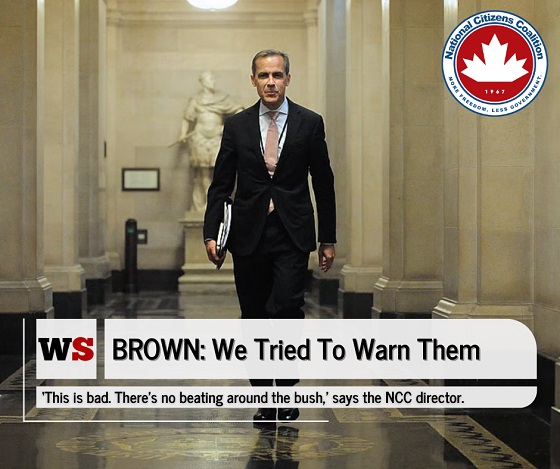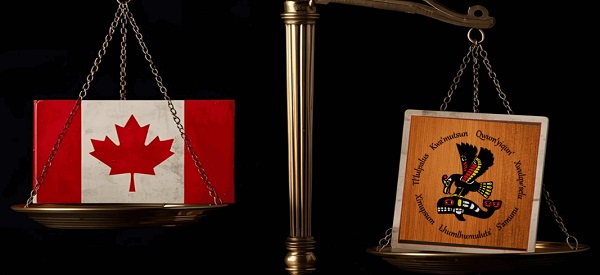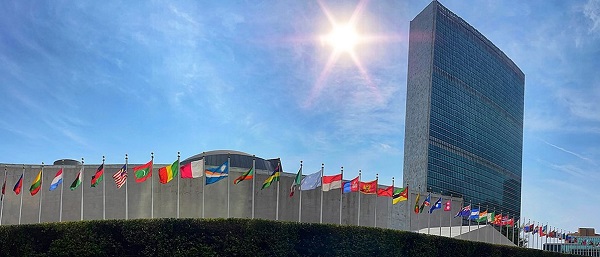National
We Tried To Warn Them

From the National Citizens Coalition
By Alexander Brown
After a week of open insults to Western Canada and Canada’s great energy producers, a refusal to address the generational housing crisis concerns held by millions of Canadians, and (another) refusal to table a federal budget, one might be forgiven for assuming we’re living the last decade all over again.
But in many ways, so far, we are.
“This has been as bad a start as it can get,” I put in a press release Thursday morning, and on that, there can be little doubt.
Gregor Robertson, Carney’s new housing minister, already represents a Brantford Boomer-style middle-finger to young and working Canadians. The architect of Vancouver’s historic affordability crisis, and one of the pioneer early-allowers of the ‘Vancouver model’ of foreign investment fraud, Robertson, just days into his federal role, declared that home prices “don’t need to come down,” dismissing the struggles of millions of Canadians priced out of the market. This tone-deaf stance, his apparent refusal to understand basic principles of supply and demand, coupled with his track record of overseeing Vancouver’s affordability crisis and the price of new homes soaring by 140%, suggests the Liberals have no plan to deliver on their promise to allow Canadian under-50s back into the housing market.
On pipelines and the dire need to kill Bill C-69, both Steven Guilbeault — a walking, talking unity crisis — and Dominic LeBlanc have already contradicted Mark Carney’s carefully-worded half-promises on becoming an “energy superpower.” The provinces may well be committed to working together — even, perhaps surprisingly, Carney’s Liberal-lite allies at Queen’s Park — but if the feds continue to be adversarial towards Canadian unity and prosperity, the doldrums of the past few years won’t just continue — they’ll accelerate.
On budgets — well, there isn’t one. (Maybe a mini one in the fall.) Still coasting on the convenient excuse of Donald Trump, even with those elbows down already, the Carney PMO, run by the same Trudeau advisers, who champion the PM as some “economic genius” (the collapse of GFANZ would suggest otherwise), have picked up right where Justin left off when it comes to economic unaccountability.
The decision to appoint Sean Fraser as minister of justice is just as troubling. Fraser, who previously oversaw historically unsustainable immigration levels as immigration minister and delivered no measurable results as housing minister, now takes on a justice portfolio at a time when random violent attacks are leaving families shaken across Canada. Reports of stabbings, assaults, and public safety breakdowns dominate headlines, yet Fraser’s early comments suggest he may prioritize working from home over tackling the crime wave head-on. Canadians need a justice minister focused on restoring safety and locking up criminals, not one repeatedly failing upward into another role he’s unprepared to handle. Like the endless healthcare wait-times coupled with unvetted mass-immigration, the continuation of a status-quo on drugs, crime, chaos, and catch-and-release will quite literally kill, and kill by the thousands.
On all of this, the hollowness of “elbows up,” the cynical fear-mongering, the blaringly-obvious rhetorical hedges to ever avoid saying “oil,” “gas,” or “pipeline” on the campaign trail, the lack of movement on crime or chaos, and the threat of more of the same on housing, we tried to warn Liberal voters.
That it didn’t matter to them, that it still won’t, will be a source of frustration and alienation that doesn’t bode well for the future of ‘Team Canada,’ if that team still even exists at all. You deserved better. Your kids and grandkids deserved better. There’s still time to right some of this wrong, to soften the beginnings of a new lost Liberal decade, that, together, we may mercifully cut short. But this is bad. There’s no beating around the bush.
We tried. We failed. They failed.
We get up, and try again.
Alexander Brown is the Director of the National Citizens Coalition.
Fraser Institute
Métis will now get piece of ever-expanding payout pie

From the Fraser Institute
By Tom Flanagan
The history of Ile-à-la-Crosse (IALC) in northern Saskatchewan goes back to 1776, when Thomas Frobisher established a fur trading post. Catholic Oblate missionaries arrived in 1846 and founded a small day school the next year, which was turned into a boarding school in 1860. Louis Riel’s sister Sara taught there until she died of TB in 1883. Under various names and at various locations, the school survived until the early 1970s.
The students were mainly Métis from northern Saskatchewan, with a sprinkling of Indian and white children. It was never an Indian Residential School (IRS) in the legal sense, though the federal government did at times make financial contributions proportional to the small number of status Indian children who attended. The school was mainly supported by the Oblate order and the Grey Nuns, with contributions from the province of Saskatchewan in later years.
Because the school was not an IRS, those who had attended were excluded from the IRS Settlement Agreement negotiated by Paul Martin’s government in 2005 and implemented by Stephen Harper’s government afterwards. Most students had been Métis, and the Settlement Agreement generally excluded Métis who had attended mission boarding schools that were not IRS. Wanting to share in the $5 billion financial compensation provided by the Agreement, the IALC students started legal action, using Tony Merchant’s law firm. Merchant, however, moved too slowly for the complainants, so the Sotos firm started another class action in 2022.
Following the “resistance is futile” policy enunciated by Jodi Wilson-Raybould when she was minister of justice, the federal government had already decided not to litigate, having signed in 2019 a memorandum of understanding to negotiate the claims. In March 2025, the federal government reached an agreement-in-principle with IALC students, which will go before a federal court judge for approval in January 2026. Saskatchewan announced its own agreement-in-principle in September, which will also go before the federal court.
Canada is putting up $27 million and Saskatchewan $40 million for individual compensation. With an estimated 600-700 “survivors,” this equates to individual payouts of about $100,000 apiece. This is admittedly guesswork, because neither agreement-in-principle has been published. News reports indicate that “families” will be involved in the compensation, so a larger number of claimants may materialize.
The federal news release says that compensation is being paid for “cultural loss abuse,” which includes loss of proficiency in the Cree and Michif languages spoken by the Métis in that area. Sexual and physical abuse are not mentioned, even though “survivors” claim to have been abused. Payments will be made to all who attended, as with the federal day school settlement and the “common experience” payment in the IRS settlement.
In the world of government, the joint payout of $67 million is a penny-ante affair, but the long-term implications are much greater. There are tens of thousands of Métis adults who attended mission boarding schools, both Protestant and Catholic, that were not considered IRS and were not admitted to the IRS Settlement Agreement. For them, the IALC settlement is like a dam breaking, setting a precedent for compensation. Class action law firms will commence new actions. Individual cases will be small, but there will be so many of them that the federal government will probably consolidate them into one multi-billion-dollar settlement, and the provinces will fall into line.
When Prime Minister Harper decided to implement the IRS settlement Agreement, he thought it would bring peace on the Indigenous front, allowing the government to move forward. It was an understandable hope, but in fact that decision unleashed a series of class actions that have cost taxpayers more than $50 billion and rising. When Harper was in power, he kept the lid on; but payments exploded after Justin Trudeau became prime minister in 2015 and made Wilson-Raybould minister of justice. Her instruction to Department of Justice lawyers to negotiate rather than litigate, which is still in force, caused resistance to Indigenous class actions to collapse and facilitated enormous payouts culminating in the $40 billion-plus child-care settlement. Now the Métis will get their piece of this ever-expanding payout pie.
Business
US government buys stakes in two Canadian mining companies

From the Fraser Institute
Prime Minister Mark Carney recently visited the White House for meetings with President Donald Trump. In front of the cameras, the mood was congenial, with both men complimenting each other and promising future cooperation in several areas despite the looming threat of Trump tariffs.
But in the last two weeks, in an effort to secure U.S. access to key critical minerals, the Trump administration has purchased sizable stakes in in two Canadian mining companies—Trilogy Metals and Lithium Americas Corp (LAC). And these aggressive moves by Washington have created a dilemma for Ottawa.
Since news broke of the investments, the Carney government has been quiet, stating only it “welcomes foreign direct investment that benefits Canada’s economy. As part of this process, reviews of foreign investments in critical minerals will be conducted in the best interests of Canadians.”
In the case of LAC, lithium is included in Ottawa’s list of critical minerals that are “essential to Canada’s economic or national security.” And the Investment Canada Act (ICA) requires the government to scrutinize all foreign investments by state-owned investors on national security grounds. Indeed, the ICA specifically notes the potential impact of an investment on critical minerals and critical mineral supply chains.
But since the lithium will be mined and processed in Nevada and presumably utilized in the United States, the Trump administration’s investment will likely have little impact on Canada’s critical mineral supply chain. But here’s the problem. If the Carney government initiates a review, it may enrage Trump at a critical moment in the bilateral relationship, particularly as both governments prepare to renegotiate the Canada-U.S.-Mexico Agreement (CUSMA).
A second dilemma is whether the Carney government should apply the ICA’s “net benefits” test, which measures the investment’s impact on employment, innovation, productivity and economic activity in Canada. The investment must also comport with Canada’s industrial, economic and cultural policies.
Here, the Trump administration’s investment in LAC will likely fail the ICA test, since the main benefit to Canada is that Canadian investors in LAC have been substantially enriched by the U.S. government’s initiative (a week before the Trump administration announced the investment, LAC’s shares were trading at around US$3; two days after the announcement, the shares were trading at US$8.50). And despite any arguments to the contrary, the ICA has never viewed capital gains by Canadian investors as a benefit to Canada.
Similarly, the shares of Trilogy Minerals surged some 200 per cent after the Trump administration announced its investment to support Trilogy’s mineral exploration in Alaska. Again, Canadian shareholders benefited, yet according to the ICA’s current net benefits test, that’s irrelevant.
But in reality, inflows of foreign capital augment domestic savings, which, in turn, provide financing for domestic business investment in Canada. And the prospect of realizing capital gains from acquisitions made by foreign investors encourages startup Canadian companies.
So, what should the Carney government do?
In short, it should revise the ICA so that national security grounds are the sole basis for approving or rejecting investments by foreign governments in Canadian companies. This may still not sit well in Washington, but the prospect of retaliation by the Trump administration should not prevent Canada from applying its sovereign laws. However, the Carney government should eliminate the net benefits test, or at least recognize that foreign investments that enrich Canadian shareholders convey benefits to Canada.
These recent investments by the Trump administration may not be unique. There are hundreds of Canadian-owned mining companies operating in the U.S. and in other jurisdictions, and future investments in some of those companies by the U.S. or other foreign governments are quite possible. Going forward, Canada’s review process should be robust while recognizing all the benefits of foreign investment.
-

 Agriculture1 day ago
Agriculture1 day agoIs the CFIA a Rogue Agency or Just Taking Orders from a Rogue Federal Government?
-

 Business2 days ago
Business2 days agoTrump Blocks UN’s Back Door Carbon Tax
-

 Business1 day ago
Business1 day agoJudges are Remaking Constitutional Law, Not Applying it – and Canadians’ Property Rights are Part of the Collateral Damage
-

 Red Deer1 day ago
Red Deer1 day agoYour last minute election prep: Common Sense Red Deer talks to the candidates
-

 Daily Caller2 days ago
Daily Caller2 days agoTrump urges Putin, Zelenskyy to make a ‘deal’
-

 Business2 days ago
Business2 days agoTrump Admin Blows Up UN ‘Global Green New Scam’ Tax Push, Forcing Pullback
-

 espionage1 day ago
espionage1 day ago“Suitcase of Cash” and Secret Meeting Deepen Britain’s Beijing Espionage Crisis
-

 Energy58 mins ago
Energy58 mins agoMinus Forty and the Myth of Easy Energy








